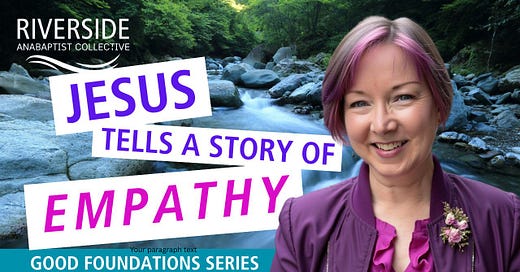Hello Dear Ones,
Today’s Text:
The Parable of the Good Samaritan – Luke 10
25 On one occasion an expert in the law stood up to test Jesus. “Teacher,” he asked, “what must I do to inherit eternal life?”
26 “What is written in the Law?” he replied. “How do you read it?”
27 He answered, “‘Love the Lord your God with all your heart and with all your soul and with all your strength and with all your mind’[a]; and, ‘Love your neighbor as yourself.’[b]”
28 “You have answered correctly,” Jesus replied. “Do this and you will live.”
29 But he wanted to justify himself, so he asked Jesus, “And who is my neighbor?”
30 In reply Jesus said: “A man was going down from Jerusalem to Jericho, when he was attacked by robbers. They stripped him of his clothes, beat him and went away, leaving him half dead.
31 A priest happened to be going down the same road, and when he saw the man, he passed by on the other side.
32 So too, a Levite, when he came to the place and saw him, passed by on the other side.
33 But a Samaritan, as he traveled, came where the man was; and when he saw him, he took pity on him.
34 He went to him and bandaged his wounds, pouring on oil and wine. Then he put the man on his own donkey, brought him to an inn and took care of him.
35 The next day he took out two denarii and gave them to the innkeeper. ‘Look after him,’ he said, ‘and when I return, I will reimburse you for any extra expense you may have.’
36 “Which of these three do you think was a neighbor to the man who fell into the hands of robbers?”
37 The expert in the law replied, “The one who had mercy on him.”
Jesus told him, “Go and do likewise.”
Song that we’re loving for small group contemplation: “For your Goodness and your Mercy”
A song of confession “Lord have Mercy”
https://www.facebook.com/share/v/1AULFtxBia/
A closing prayer: “Seeds”
(Some of these songs are quite short and it’s not a bad idea to play them a number of times if that is what you’re sensing.)
Question for discussion:
What was one of your favorite days in the last month, and why?*
*Question from the Table Conversations deck put out by John Mark Comer and Practicing the Way.
In your group:
I would suggest offering each person an agreed upon amount of time to answer this question, with someone working as a timekeeper. It is important that this time of conversation reflects the entire gathered community - even those who don’t usually share very often.
And as you close your time together:
I leave you with this blessing:
I release you in the power of the Holy Spirit into the world God so loves, to do justice, to love mercy, and to walk humbly with the God, who sees the goodness and grace in you and walks proudly with you.
Blessings,
Carmen
This post is offered for individual worship, and for sharing with your small group and member congregations. It is offered free of charge at this time - you do not need to be a paid subscriber to access this content.
TRANSCRIPT
In our text today, we have five questions and Jesus tells a story.
Here are the five questions:
“what must I do to inherit eternal life?”
“What is written in the Law?”
“How do you read it?”
“Who is my neighbor?”
(And then there's a story, and finally one more question:)
Which one of these three do you think was a neighbor?
“What must I do to inherit eternal life?”
Let's just start by acknowledging that the Lawyer who asked this question wasn't asking it because he wanted to know, he was asking it to test Jesus. He already had his mind made up before he asked the question.
He's basically asking how to go to heaven, right? He wants to inherit eternal life.
Jesus answers the Lawyer's question with two of his own: “What is written in the Law?” And “How do you read it?” So he's asking him what the text says and his interpretation.
The Lawyer first cites Deuteronomy 6:5 which reads:
“Love the Lord your God with all your heart, with all your soul, and with all your strength.”
Another way to translate this would be: Love Jehovah with all your passions and emotions, with all your mind, will and character, and with all your substance, and might. This is a significant all encompassing command to the family of Jacob in Deuteronomy.
The Lawyer also cites a verse in Lev 19 which reads:
“18 Do not take revenge or bear a grudge against members of your community, but love your neighbor as yourself; I am the Lord.”
The Lawyer finds “love your neighbor as yourself” to be the important part of that verse. (How much of a verse or chapter we quote is an interpretation in itself.)
And Jesus affirms his answer. The Lawyer knew the Torah and had determined that these two verses were the most important ones in the entire text. Jesus agrees with him – yep, those two are the most important ones!
Love God … love your neighbor!
Jesus replied. “Do this and you will live.”
Luke 10:29 in the Anabaptist Community Bible goes on to say:
“But then the legal expert wanted to prove he was right, so he said to Jesus, “And who is my neighbor?”
Now the Lawyer just quoted Lev 19, and this chapter also (17) talks about your fellow Israelites. And in verses 33,34 it also says
“When an alien resides with you in your land, you must not oppress him. You will regard the alien who resides with you as the native-born among you. You are to love him as yourself, for you were aliens in the land of Egypt; I am the Lord your God.”
So I suggest that the Lawyer knew about loving his Hebrew neighbors and his alien neighbors. But he's asking Jesus “who is my neighbor?” as a test. So how does Jesus answer a question that seems to come with some baggage?
Jesus answers his question with the story of the Good Samaritan.
You know the story, a man is leaving Jerusalem to go to Jericho when he's attacked, stripped, beaten, and left for dead.
A priest goes by and saw the man looking dead, and passed by on the other side. A Levite does the same thing. The text says the man is leaving Jerusalem, so we know they are not headed to serve in the temple – they are walking away from it. They are not late for services, that's not why they didn't stop.
But a Samaritan, as he traveled, came where the man was; and when he saw him, he took pity on him. He went to him and bandaged his wounds, pouring on oil and wine. Then he put the man on his own donkey, brought him to an inn and took care of him.
My Cultural Background Study Bible tells me that Jews and Samaritans generally hated each other and you wouldn't expect a Samaritan to have anything to do with a Jew – much less help him. But he takes care of this man. And he tells the innkeeper,
‘Look after him and when I return, I will reimburse you for any extra expense you may have.’
My study Bible says that innkeepers had a reputation for being untrustworthy, so the Samaritan is providing financial incentive for him to really take care of the man.
So now Jesus has a question:
“Which of these three do you think was a neighbor to the man who fell into the hands of robbers?”
The Priest, the Levite, or the Samaritan? The religious leaders, or the outsider?
The Lawyer responds: The one who had mercy on him.
Jesus told him, “Go and do likewise.”
So with this story Jesus is suggesting that we have mercy on the people in our path. Regardless of who they are and where they came from – even if they're a member of a hated people group. Do I have that about right?
And he's using this story to answer a question. “What must I do to inherit eternal life?”
Here we see the subversive upside-down kingdom of Jesus the Messiah who showed up and rattled the conventions. Sure, it's easy to say: “We look out for each other around here, and you're not from around here.” Jesus turns that on it's head.
Love God for all you're worth. Love humanity around you. Have mercy. Do this, and you will live.
Compassion
We see the compassion of Jesus for the Samaritan outsider, and he makes him the hero of the story. We see the compassion of Jesus for the man who has been a victim. We see the gentle compassion of Jesus for the Lawyer who had the information but not the heart. He's trying to finigle his way out of mercy. And we see that the Samaritan checked back in on the guy, and maybe there was a relationship that developed there. Maybe it wasn't just a hit and run act of kindness, but a growing connection. All of that glorious goodness in this story is empathy.
We notice that somehow the outsider who knew what it was to be an outsider - also understood what empathy was. And he lived it.
We're afraid to be generous, maybe we won't have enough – we have this scarcity mentality. But God's economy flows in generosity – especially when the spirit of the age is greed and bigotry.
So what is our takeaway?
Love the Lord your God with all that you are.
Love your neighbor as yourself.
And when in doubt:
Have mercy.
Live generously.
Check on people.
Do this and you will live.
Here's where I want to step back for a second, because I have two neighbors who are absolute jerks. So my question becomes HOW?
How do I love someone who is disrespectful of my property, and my person? How do I love thoughtless, loud, and offensive people – especially when they're bullies? How do I love an ex-con and someone on the sex offender registry? How do I love people who are racist and use the N word. I'll be honest. I am not sure I know how. This is not a text that I find easy to live into. How about you? Because I think we all know some folks who we find a little trying. So how does this “love one another” thing work?
If we are commanded to love our neighbors that we find difficult to love – are we going to be like the lawyer and try to find the exceptions and loopholes? Are we going to wiggle out of loving “those people” because – for whatever made up reason – they are unworthy of love. They are undeserving. Clearly Jesus would have made an exception if he just knew about those people – right? It might even be helpful to assert that there are people God doesn't like. That would get us all off the hook, and make this a lot easier, right? Because clearly what God meant was for me to love my family, and then whoever else I happened to have a little time for… (nope)
God loves my racist neighbor. I'm finding that difficult.
Let's take a step back.
The love that I give my neighbor is not my own.
Where do I go to get the love for my neighbor that I clearly lack?
The God who loves us in Isaiah 61 tells us about a crown of beauty instead of ashes. The oil of gladness instead of mourning, and a garment of praise instead of a spirit of despair.
This is the great exchange.
I come with my ashes, my mourning, my despair... all of my striving and efforts that have ended badly. I bring all the ashes, all the disappointments and I pile them up on the counter. And there's Jesus looking it all over and saying, ok, I see what you've got here. I've got some good things to trade you for this mess. How about some beauty? How about gladness? How about a new garment of praise? You've been carrying all the shoulds and aughtas and quite a stack of shame and pressure to be good – how about some grace instead? You've been looking at the people you don't know how to love, here... take my love. This'll help. This'll work. You don't have to make it up, you just have to be open and allow it to flow through you.
See, I think one of the reasons we find it so hard to love some folks is because we know we're supposed to be good. We know we are supposed to have mercy. We know all of those things... but we find it really hard to put them into practice. And so we make up excuses. For Example: Don't give to panhandlers – they'll only spend the money on drugs and alcohol. But these excuses to close down your generosity. Excuses close down your empathy. Excuses. But our excuses just leave us holding the bag of shame – knowing that we're just not going the distance. We can justify ourselves all day long, but in the end – what is left of our heart knows that we have been stingy, greedy, and we have hoarded what was supposed to flow through our fingers. But our hands were tightly closed. And our body and our spirit will know that shame, and we may not be able to put a finger on it and name it – but we feel that something isn't right.
“Being good” can be difficult.
So what if we lay all our efforts, excuses, and exceptions on the alter. Let's step back for a second and allow Jesus to look over this mess. And when he has had a second to look it all over, I think what will happen is that Jesus will look up and you and remind you that he loves you. Because He loves you, because He loves you, because He loves you, because He loves you…
Because He loves you. Because He LOVES you. Because He loves You.
And somehow when that starts to filter through all our defenses and justifications... and we begin to know that we are loved… Then I think it becomes easier to love people. And suddenly the miracle happens – you can love some undeserving person genuinely. Because we know it's not our love. It's the love of God poured out in Jesus and sealed with the beautiful Holy Spirit. This love flows through us, and it flows like a river... some of that icky stuff flows away in the river. The excuses. The blame. The striving. The trying and failing... All the garbage goes in the great exchange of beauty for ashes.
This is empathy.
This is God's great empathy for us. And this is the great empathy of Jesus who tells this story about how to get eternal life, and then also gives us a way to actually live into that ideal with our ugliest neighbors. And the empowering presence of the Holy Spirit who flows love into us in exchange for our mess, and then flows love out and through us. And whoever the Three put in our path that needs help – that's comes with the knowledge that we're not on our own when we offer help – we do so through the empathy, generosity, and kindness of the Three.
Amen?
Amen.
So when I ask you to love God with your whole being, it's possible as a gratitude response to the great exchange God offers us. And when I ask you to love your neighbor as yourself, and you remember that Jesus loves you because he loves you because he loves you... then the Holy Spirit flows through us to our neighbor. This is the beautiful exchange of empathy and compassion.
“We love because he first loved us.” 1 John 4:19
We can not explain away the centrality of empathy to the Christian faith. We can't justify ourselves for our hard heartedness. When even the leaders of the church walk by on the other side, true love will have mercy. True love will have empathy.
Do this and you will live.
Blessings,
Carmen
I leave you with this blessing:
I release you in the power of the Holy Spirit into the world God so loves, to do justice, to love mercy, and to walk humbly with the God, who sees the goodness and grace in you and walks proudly with you.











Share this post